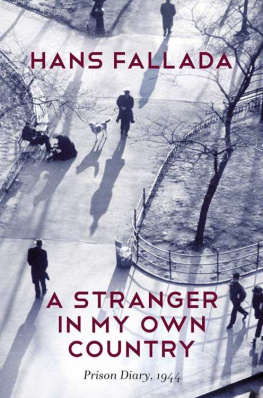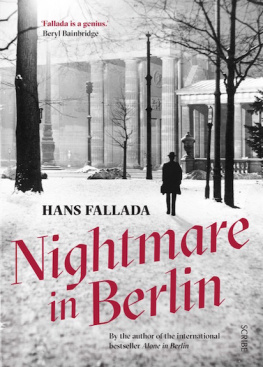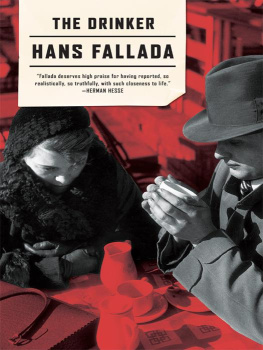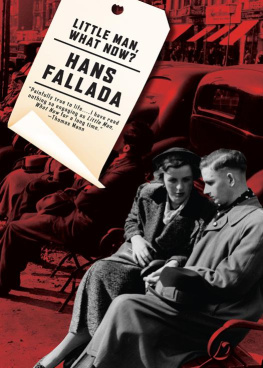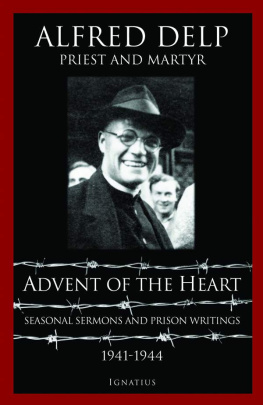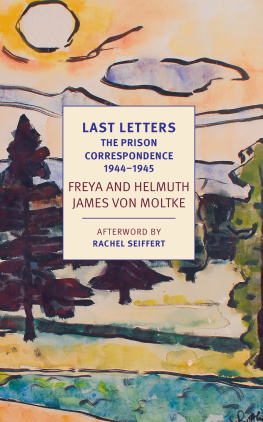A Stranger in
My Own Country
The 1944 Prison Diary
HANS FALLADA
Edited by Jenny Williams and Sabine Lange
Translated by Allan Blunden
polity
First published in German as In meinem fremden Land. Gefngnistagebuch 1944
Aufbau Verlag GmbH & Co. KG, Berlin 2009
This English edition Polity Press, 2015

The translation of this work was supported by a grant from the Goethe-Institut London which is funded by the German Ministry of Foreign Affairs
Polity Press
65 Bridge Street
Cambridge CB2 1UR, UK
Polity Press
350 Main Street
Malden, MA 02148, USA
All rights reserved. Except for the quotation of short passages for the purpose of criticism and review, no part of this publication may be reproduced, stored in a retrieval system, or transmitted, in any form or by any means, electronic, mechanical, photocopying, recording or otherwise, without the prior permission of the publisher.
ISBN-13: 978-0-7456-8155-9
A catalogue record for this book is available from the British Library.
Library of Congress Cataloging-in-Publication Data
Fallada, Hans, 1893-1947.
A stranger in my own country : The 1944 Prison Diary, 1944 / Hans Fallada. pages cm
Includes bibliographical references and index.
ISBN 978-0-7456-6988-5 (jacketed hardback : alk. paper) 1. Fallada, Hans, 18931947--Diaries. 2. Authors, German--20th century--Diaries. 3. Authors, German--20th century--Biography. 4. Prisons--Germany--Neustrelitz--History--20th century. I.nTitle.
PT2607.I6Z46 2014
833.912--dc23
[B]
The publisher has used its best endeavours to ensure that the URLs for external websites referred to in this book are correct and active at the time of going to press. However, the publisher has no responsibility for the websites and can make no guarantee that a site will remain live or that the content is or will remain appropriate.
Every effort has been made to trace all copyright holders, but if any have been inadvertently overlooked the publisher will be pleased to include any necessary credits in any subsequent reprint or edition.
For further information on Polity, visit our website: politybooks.com
Introduction
On 4 September 1944 Hans Fallada was committed to the Neustrelitz-Strelitz state facility, a prison for mentally ill criminals in Mecklenburg, some seventy miles north of Berlin, where he was to be kept under observation for an indefinite period of time. His fate was entirely uncertain.
This was not the first time that this son of an Imperial Supreme Court judge found himself behind bars. In 1923 and 1926 he had already been jailed for six months and two and a half years respectively on charges of embezzlement. In both cases his drug addiction had been a key factor. In 1933 he had been accused of involvement in a conspiracy against the person of the Fhrer, and had been taken into protective custody for eleven days. In the autumn of 1944 the charge was a different one: Fallada was accused of having threatened to kill his ex-wife on 28 August 1944.
The divorce had been finalized on 5 July 1944. Yet the couple continued to live together, with others, on the farm in Carwitz: Anna (Suse) Ditzen in the house with their three children, her mother-in-law and a constantly changing number of bombed-out friends and relatives, Hans Fallada in the gardeners flat in the barn. On that Monday afternoon at the end of August the heavily intoxicated Fallada fired a shot from his pistol during an argument. Anna Ditzen took the gun away from him, threw it in the lake and alerted Dr Hotop, the doctor from the neighbouring town of Feldberg. Both Fallada and Anna Ditzen later testified that the gunshot was not intended to kill. Dr Hotop sent the local police constable to escort his patient to Feldberg to sober up. The matter might have ended there, but the story came to the ears of an over-zealous young prosecutor. He insisted on having Hans Fallada transferred to the district court in Neustrelitz for questioning. On 31 August the accused was ordered to be temporarily committed to a psychiatric institution. On 4 September the gates of the Neustrelitz-Strelitz state facility closed behind Hans Fallada. He was placed for an indefinite period in Ward III, where insane or partially insane criminals were housed. It looked like the end of the road for him: an alcoholic, a physical and mental wreck, an author who was no longer capable of writing.
Yet Fallada used his time in prison to recover from his addictions and to write. As early as 1924, when he was in prison in Greifswald, he had kept a diary as a form of self-therapy. So now he requested pen and paper once more. His request was granted. He was given ninety-two sheets (184 sides) of lined paper, approximating to modern A4 size. As well as a series of short stories, Fallada wrote The Drinker. On 23 September, noting that his novel about alcoholism remained undiscovered, he was emboldened to start writing down his reminiscences of the Nazi period. He was one of those who stayed behind at home (as distinct from those writers and artists who went into voluntary exile when Hitler came to power): he spent the years of the Third Reich in Germany, for the most part in rural Mecklenburg, where he lived the same life as everyone else. Now he wanted to bear witness. Here in the house of the dead he felt the time had come to settle personal scores with the National Socialist regime, and also to justify the painful compromises and concessions he had made as a writer living under the Third Reich.
In the autumn of 1944 the catastrophic war was entering its final phase, and the collapse of Hitlers Germany was clearly imminent. The Allies were approaching from all sides, American troops were at the western frontier of the German Reich, while the Red Army was advancing towards East Prussia. At the same time the Nazi regime was stepping up its reign of terror and tightening its stranglehold on the German people. In committing his thoughts and memories to paper, Fallada was now putting his own life at risk.
Surrounded by murderers, thieves and sex offenders, always under the watchful eye of the prison warders, he wrote quickly and frenetically, freeing himself, line by line, from his hatred of the Nazis and the humiliations of the past years. He proceeded with caution, and in order to conceal his intentions and save paper he used abbreviations n. for nationalsozialistisch (National Socialist), for example, and N. for Nazis or National Socialism while the minuscule handwriting was enough in itself to deter the prison warders. But Fallada went further in his efforts to scramble the text, turning completed manuscript pages upside down and writing in the spaces between the lines. The highly compromising notes, part micrography and part calligraphic conundrum, became a kind of secret code or cryptograph, which can only be deciphered with great difficulty and with the aid of a magnifying glass.
On 8 October 1944, a Sunday, Hans Fallada was allowed out on home leave for the day. He smuggled the secret notes out under his shirt.
The 1944 Prison Diary
(23.IX.44.) One day in January 1933 in Schlichters Wine Bar in Berlin, enjoying a convivial dinner. Our lady wives and a few bottles of good Franconian wine kept us company. We were, as it says in the Scriptures, filled with good wine, and on this occasion it had had a good effect on us too. In my case you couldnt always be sure of that. The effect wine had on me was entirely unpredictable; generally it made me belligerent, self-opinionated and boastful. But this evening it hadnt, it had put me in a cheerful and rather jocular, bantering mood, which made me the ideal companion for Rowohlt, who is increasingly transformed by alcohol into a huge, two-hundred-pound baby. He sat at the table with alcohol evaporating, in a manner of speaking, from every pore of his body, like some fiery-faced Moloch, albeit a contented, well-fed Moloch, while I regaled everyone with my jokes and anecdotes, at which even my dear wife laughed heartily, even though she had heard these gags at least a hundred times before. Rowohlt had by now reached the state in which his conscience sometimes directs him to make a contribution of his own to the general entertainment: he would sometimes ask the waiter to bring him a champagne glass, which he would then crunch up between his teeth, piece by piece, and eat the lot, leaving only the stem behind to the horror of the ladies, who couldnt get over the fact that he didnt cut himself at all. I was present on one occasion, though, when Rowohlt met his match in this quasi-cannibalistic practice of glass-eating. He asked the waiter for a champagne glass, a quiet, placid man in the company did the same. Rowohlt ate his glass, the placid man did likewise. Rowohlt said contentedly: There! That did me good! He folded his hands across his stomach, and looked around the table with an air of triumph. The placid man turned to him. He pointed to the bare stem of the glass that stood on the table in front of Rowohlt, and taunted him: Arent you going to eat the stem, Mr Rowohlt? But thats the best part! And with that he ate the stem himself, to gales of laughter from the assembled company. Rowohlt, however, cheated of his triumph, was furious, and he never forgave the placid man for this humiliation!

